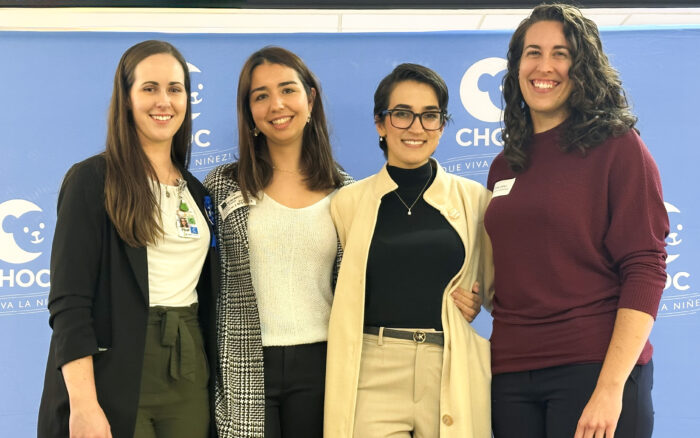After a virtual morning session of Grand Rounds and two plenary sessions related to mental health services, CHOC Research Day 2023 was back live this year with nearly 80 scientific poster and podium presentations after three years of all-online presentations due to the COVID-19 pandemic.
In his opening remarks, CHOC Chief Scientific Officer Dr. Terence Sanger said Research Day 2023 provided “a real chance for people to be able to talk about their research and hear about others’ research and to learn about the important topics that are ultimately helping us improve children’s healthcare.”
Dr. Sanger noted how pediatric mental health has become a topic of great interest and that poor outcomes have been exacerbated by the COVID-19 pandemic.
Fake news?
Dr. Sanger cautioned how parents and clinicians need to be aware of misinformation that has become rampant in the digital age.
“There’s a lot of misinformation out there,” Dr. Sanger said, “and misguiding means people make bad decisions, which is particularly harmful in healthcare. So there’s a tremendous value to us seeking out facts, which is particularly important in the realm of mental health.”
Jevin West, PhD, an associate professor and founding director of the Center for an Informed Public at the Information School at the University of Washington, expanded on this notion in his presentation, “The Impact of Misinformation on Pediatric Mental Health and Wellbeing.”
Jevin, who served as the day’s distinguished keynote speaker, brought a distinctive perspective to the realm of information science, embodying the ethos of making information work, particularly for the advancement of science, Dr. Sanger noted.
Jevin said children who spend more than three hours a day on social media show a greater risk of having mental health issues, Jevin said.
He recommended the “SIFT” method for how to source information better: Stop, Investigate the source, Find better coverage, Trace information back to the source.
He worries about students’ mistrust of information online. They need to be skeptical, he said, but being totally cynical about the validity of information isn’t productive.
Despite some decline post-COVID-19 in the trustworthiness of medical experts, “the public still does listen to you,” Jevin said.
Success in schools
Dr. Michael Weiss, vice president of population health at CHOC, moderated the first plenary session, “Community Partnerships in Mental Health,” much of which focused on CHOC’s and the Orange County Department of Education’s groundbreaking WellSpace initiative as well as a program at Matei Dei High School.
“Community outreach is in our DNA,” said Dr. Weiss, noting that population health is a pillar of CHOC’s strategic plan.
The goal of CHOC’s mental health services is to support children and youth living with mental illness so they can thrive in their community, at school, and socially with their family and friends.
The WellSpace initiative, which provides students a comfortable, dedicated place to practice social-emotional learning skills, is now in place at 34 county schools, with another 16 slated to open in 2024 thanks to generous philanthropic support as well as money from school districts, Dr. Weiss said.
Mayu Iwatani, MSW, PPSC, manager of mental health and wellness care coordination with the Orange County Department of Education, said the goal is to eventually open WellSpaces in all O.C. elementary, middle, and high schools.
Only a third of kids experiencing mental health issues seek treatment, Mayu said, and WellSpaces are meant to target that population. The spaces are designed for students to “have a mental reset” so they can re-engage in classroom learning quickly, Mayu said.
“WellSpaces are evidence based,” Dr. Weiss said, “and we think they’re the portal to really talk about mental health and to work on destigmatizing pro-active approaches to mental health.”
‘An exciting time’
Dr. Terri Iler, director of community clinical outreach at CHOC Population Health, detailed several grant-funded mental health initiatives in the works.
“It’s an exciting time at CHOC,” Dr. Iler said.
Ana D’Abrau, PhD, a school and clinical psychologist at CHOC, discussed a successful program at Mater Dei High called “Be Well Mater Dei,” in which every student is taught social and emotional skills.
School counselors have been trained to provide day-to-day support so CHOC specialists can focus on moderate to severe mental health conditions that present at school, Ana explained.
Results, so far, have been dramatic.
Comparing school years 2022-23 and 2021-22, there has been a 71.43 percent decrease in referrals for eating disorders, a 55.56 percent decrease in referrals for thoughts of self-harm, a near-40 percent decrease in referrals for suicidal ideation, and a 48.31 percent decrease referrals for depression.
“Ana’s work is truly groundbreaking,” Dr. Weiss said.
Vanesa Perez, a post-doctoral fellow is psychology at CHOC, has been working on a school re-integration program for children who seek help for mental health concerns.
“So far, we’ve received great feedback from the school districts,” Vanesa said.
The program is in the research phase, with plans to develop a sustainable program long term.
“We’ll be looking at students who received mental health services prior to and after hospitalization as well as the effects on grades,” Vanesa explained.
Ana Fernandez, ACSW and the school liaison at CHOC’s Mental Health Inpatient Center (MHIC), noted that the MHIC, which opened in April 2018, is the first unit in Orange County to take children as young as 3 for psychiatric stabilization
“When it opened,” Ana said, “there was minimal communication between hospitals and schools after students were psychiatrically hospitalized.”
Now, that channel of communication continues to dramatically improve.
Laws have made it a requirement for K-12 schools to address suicide prevention, intervention, and post-intervention.
Emerging topics
Heather Huszti, PhD, chief psychologist at CHOC as well as the section chief for pediatric psychology, moderated the second virtual session, “Emerging Topics in Pediatric and Adolescent Mental Health Care and Services,” which addressed challenges, presented emerging research, and discussed opportunities related to the provision of mental health care services to the youth of California and beyond
Quincy Byrdsong, EdD, CIP, CCRP, vice president of research operations at Ballad Health, traced the evolution of DEI (Diversity, Equity, Inclusion) in general and as it pertains to healthcare.
“Health equity means every person has the opportunity to attain his or her own health potential,” Quincy said.
Mary Fristad, PhD, director of academic affairs and research development in the division of child and family psychiatry and Big Lots behavioral health services at Nationwide Children’s Hospital, detailed bipolar disorders and the challenges involved in diagnosing them in children.
Less than half of diagnoses begin in adulthood and repeated patient visits often are needed to accurately diagnose, she said.
“Bottom line,” Mary said, “bipolar spectrum disorders can be diagnosed appropriately, accurately and effectively in kids you need to take your time and be thorough, treatment is definitely multi-modal and therapy should include the child and the family.”
Dr. Bonnie Zima, a professor-in-residence specializing in child and adolescent psychiatry and associate director of the UCLA Center for Health Services and Society, discussed the use of acute mental health care in emergency departments at U.S. children’s hospitals before and after COVID closures.
During the first year of the pandemic, one in five children reported an increase in depression and one in four children reported an increase in symptoms of anxiety, Bonnie said.
During COVID-19, thoughts of suicide or self-injury increased nearly 13 percent, and psychotic disorders nearly 11 percent among children, she said.
Posters and presentations
During the afternoon session, the second-floor lobby of the Bill Holmes Tower, in addition to some hallways, teemed with people poring over the record number of posters from scientists at CHOC, UC Irvine, Chapman University, and Biola University.
The broad spectrum of posters covered basic research, translational research, clinical research, and social studies.
Study topics ranged from “cyberflashing” and other unwanted sexting experiences of 11- to 18-year-olds; to a portable and mechanical tremor-reducing upper extremity brace called Move-D developed by The Sharon Disney Lund Medical Intelligence, Information, Investigation, and Innovation Institute (Mi4); to a new kind of acupuncture with electrodes championed by, among others, pediatric oncologist Dr. Lilibeth Torno.

“The posters were diverse and exciting, with tremendous participation from students and trainees,” said Dr. Coleen Cunningham, senior vice president and pediatrician in chief at CHOC.
“It was wonderful to have the authors share their work and excitement about their projects,” added Dr. Cunninghman, who also is professor and chair of the Department of Pediatrics at UC Irvine.
Poster winners
Venus Mostaghimi, a Ph.D., a graduate student in Prof. Beth Lopour’s lab within the department of biomedical engineering at UC Irvine who works with CHOC neurologists on her projects, won an award for her poster about a massive CHOC-led study aimed at early detection and outcome prediction of infantile epileptic spasms syndrome (IESS), a severe form of childhood epilepsy that can be difficult to diagnose and treat.
Venus’ project was one of five to receive best poster awards at Research Day 2023. She was one of two students to win the honor, along with her lab mate, another graduate student from Prof. Lopour’s lab, Blanca Romero Milà, who also works with CHOC neurologists.
Other winners were Chloe Christensen, Ph.D., a scientist I at CHOC; Emily Campi, a postdoctoral fellow at Chapman University; and CHOC infectious diseases pharmacist Matin Tuan Tran.
Fun with slime
In addition to viewing the posters, Research Day 2023 featured science experiments that included extracting DNA from a strawberry, making “elephant toothpaste” with warm water, yeast, peroxide, and food coloring in a flask, and concocting “fluffy slime” using common household products.
CHOC coordinated with Child Life to bring patients out of their rooms to take part in Research Day and the science activities were specifically set up for both inpatients and well as outpatients.
Ending the day was a podium session during which eight researchers introduced their projects and took questions.
Pediatric gastroenterologist Dr. Kenneth Grant was among the presenters.
He gave an overview of a research project concerning pediatric inflammatory bowel disease (IBD) – a chronic illness doctors strive to keep under control but in which kids, unfortunately, are in for the long haul.
“Personalizing care is critical,” said Dr. Grant as he explained a research project in which scientists are looking at tissue pathology slides from patients and seeing if computers can mimic what pathologists actually see.
“Can the computer see something more nuanced or different?” Dr. Grant asked. “Can we inform ourselves better on how to classify and treat these patients?”
Phuong Dao, executive director of the CHOC Research Institute, thanked all the Research Day 2023 participants.
“The breadth and depth of the research presented today reflect the dedication and passion of our collective scientific community,” she said. “Your commitment in advancing knowledge and sharing insights and fostering collaboration has woven a very rich tapestry of ideas and innovation over a diverse range of topics.
“I want to celebrate this collaborative spirit that unites all of us in our pursuit of discovery and innovation.”

Learn about pediatric research and clinical trials at CHOC




